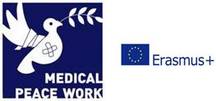Climate Crisis, Violent Conflict and Health
July 25th - 31st 2021
The 2021 summer school explored interdependencies between the climate crisis, militarisation and violent conflict, and health. It addressed root causes for health and climate injustice within the globalised neo-liberal economy and sought to envision alternatives and solutions.
The coursework used an intersectional approach to understand how multiple forms of discrimination combine, overlap or intersect especially in the experiences of marginalized individuals or groups. This helped us to improve our analysis of specific and unequally distributed vulnerabilities in the face of climate crisis, violence or ill-health, as well as structural barriers i.e. to participation or healthcare access. In the words of Varshini Prakash: “We need to address the inherent inequalities in our system that lead to some people breathing worse-quality air, experiencing the brunt of storms and being able to recover far slower than other people. […] Those inequalities almost always fall along lines of race, class and gender.”
During the summer school we asked questions such as: what are the effects of the climate crisis on health and what are the co-benefits of carbon reduction measures? How are spiralling military expenditures connected to conflict in the Global South and what can medical peace work look like in such contexts? How can we actively initiate change and bring together justice movements? And what can we learn from feminist or indigenous struggles for alternative conceptualisations of society, economy and the relationship between humankind and the ecosystems we live in?
For more information, please check out the programme and our speakers.
The summer school was kicked-off by our first online Global Health Conference: Taking action in uncertain times: Steps towards Systemic Change at the Intersection of Climate & Health. This conference aimed to provide a platform for civil society stakeholders to create and participate in a discourse that advocates for systemic change and also on how to push for more substantial action, accountability, and transparency at the top. Find the programme here for more info.
Participant Voices 2021
"The summer school focussed on pressing issues on climate change – which poses the greatest threat to health in the 21st century. Multiple topics were covered, approaching global health from diverse backgrounds and professions and that made the conversations really interesting.
The participants were enthusiastic and shared experiences which I found really relatable and made me feel that I am not alone when it comes to tackling global health issues.
Most importantly I have learnt:
1. The global North and South need to act in harmony
2. Issues on global health, feminism, LGBTIQ+ and human rights are related and cannot be tackled independent from one another and we need solutions that cut across"
Victor - medical student at Moi University, Eldoret, Kenya
"The Global Health Summer School was like a little utopia. The organizing team created a safe and open learning space. They managed to select a huge variety of wonderful participants. The atmosphere was caring and respectful at all times and filled with dignity.
Now having studied international emergency and disaster relief aid for the past three years I finally was offered a place where I was able to transform theoretical concepts into interesting discussions with people from a variety of sectors in the humanitarian aid work. The range of content presented by experts and participants alike was vast and it covered many important topics about and connected with the climate crises, discrimination, problematic system structures and planetary health. All that was connected with insights in present/active organizations and activisms which gave me so much inspiration and motivation!
I gained so much strength by seeing so many people, all over the globe, peacefully but determined fighting for humanity and mother earth. The connections I built there may be the best thing I took out of the Summer School because only together can we see the big picture, create power and rise up for global justice and health."
Jumana - student at Akkon University of Human Sciences, Berlin, Germany
"The Summer School was a great opportunity for me to integrate my theoretical knowledge about global health and climate change with more practical aspects.
The gender and climate justice lenses used to look at health, climate and violent conflicts were extremely relevant.
Leaving the Summer School, I feel not only inspired to pursue a career in Global Health but also to become an activist in my personal life and use my voice to advocate for bigger systematic changes to tackle climate crisis.
I highly recommend Summer School to anyone interested in Global Health and is looking for a place to discuss ideas with other passionate students and health professionals."
Guilia Mantovani, Master Student in Global Health at University of Copenhagen
"In addition to the incredibly good inputs, the interaction with the very diverse group was extremely enriching. Even with already some experience in some topics I learned a lot and this summer school enriched my perspectives and broadened my horizon."
Stefan - nurse and student of Geography of Environmental Risk and Human Security, Bonn, Germany
Supported by:
ENGAGEMENT GLOBAL mit Mitteln des Bundesministeriums für wirtschaftliche Zusammenarbeit und Entwicklung

and Medical Peace Work







